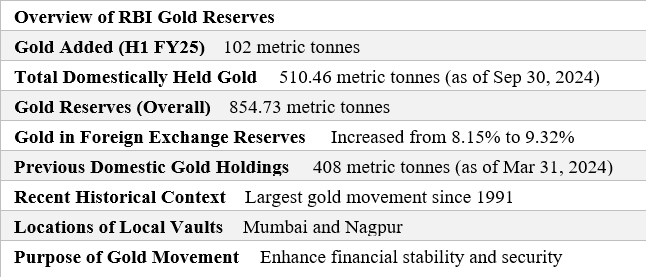The Reserve Bank of India (RBI) has increased its domestically-held gold reserves by 102 metric tonnes in H1 FY25. This move enhances India’s financial stability and security. The total gold reserves now stand at 854.73 metric tonnes. Consolidating gold within the country reduces reliance on foreign assets. This strategic decision reflects the RBI’s commitment to safeguarding India’s economic interests.


Table of Contents
Overview of Gold Reserves Increase
The Reserve Bank of India (RBI) has announced the addition of 102 metric tonnes to its domestically held gold reserves during the first half of FY25 (April-September 2024). As of September 30, 2024, the total domestically held gold stood at 510.46 metric tonnes, a significant rise from 408 metric tonnes on March 31, 2024.
Overall Gold Reserves
In addition to the domestically held gold, the RBI also increased its total gold reserves by 32 metric tonnes, bringing the overall gold reserves to 854.73 metric tonnes. This figure is detailed in the RBI’s half-yearly report on the management of foreign exchange reserves.
Shifting Gold to Local Vaults
India has been gradually transferring gold reserves to local vaults, primarily located in Mumbai and Nagpur. This effort has gained momentum in recent years, with 100 metric tonnes moved from the UK to India in FY24. This strategy reflects a broader move to secure national assets amid increasing global geopolitical tensions.
Historical Context
The current gold movement is one of the largest undertaken by India since 1991, when the country had to pledge a significant portion of its gold holdings during a foreign exchange crisis. As of now, 324.01 metric tonnes of gold remain in safe custody with the Bank of England and the Bank for International Settlements (BIS).
Value of Gold in Foreign Exchange Reserves
The proportion of gold in India’s total foreign exchange reserves increased from 8.15% at the end of March 2024 to approximately 9.32% by the end of September 2024. This increase is attributed to both the rise in tonnage and the surge in global gold prices.
Secrecy in Gold Movement
Gold movements are typically handled with high levels of secrecy due to the significant value involved. Officials from the Ministry of Finance, the RBI, and other agencies are responsible for overseeing these operations.
Conclusion
In my opinion, the RBI’s strategy to bolster gold reserves domestically is a prudent move, especially in a world characterized by economic uncertainty and geopolitical tensions. The Reserve Bank of India’s recent addition of 102 metric tonnes to its gold reserves is a strategic and timely decision. This move enhances India’s financial stability amid global uncertainties and economic fluctuations. By consolidating gold domestically, the RBI is reducing dependence on foreign holdings, which is crucial for national security. The increase in gold’s share within foreign exchange reserves—from 8.15% to 9.32%—signals a commitment to using gold as a stabilizing asset. Additionally, moving gold to local vaults improves security and liquidity, allowing for quicker responses to economic shifts. This strategy not only protects national interests but also boosts investor confidence, potentially attracting more domestic and foreign investments. Overall, this proactive approach positions India to navigate future economic challenges effectively.



